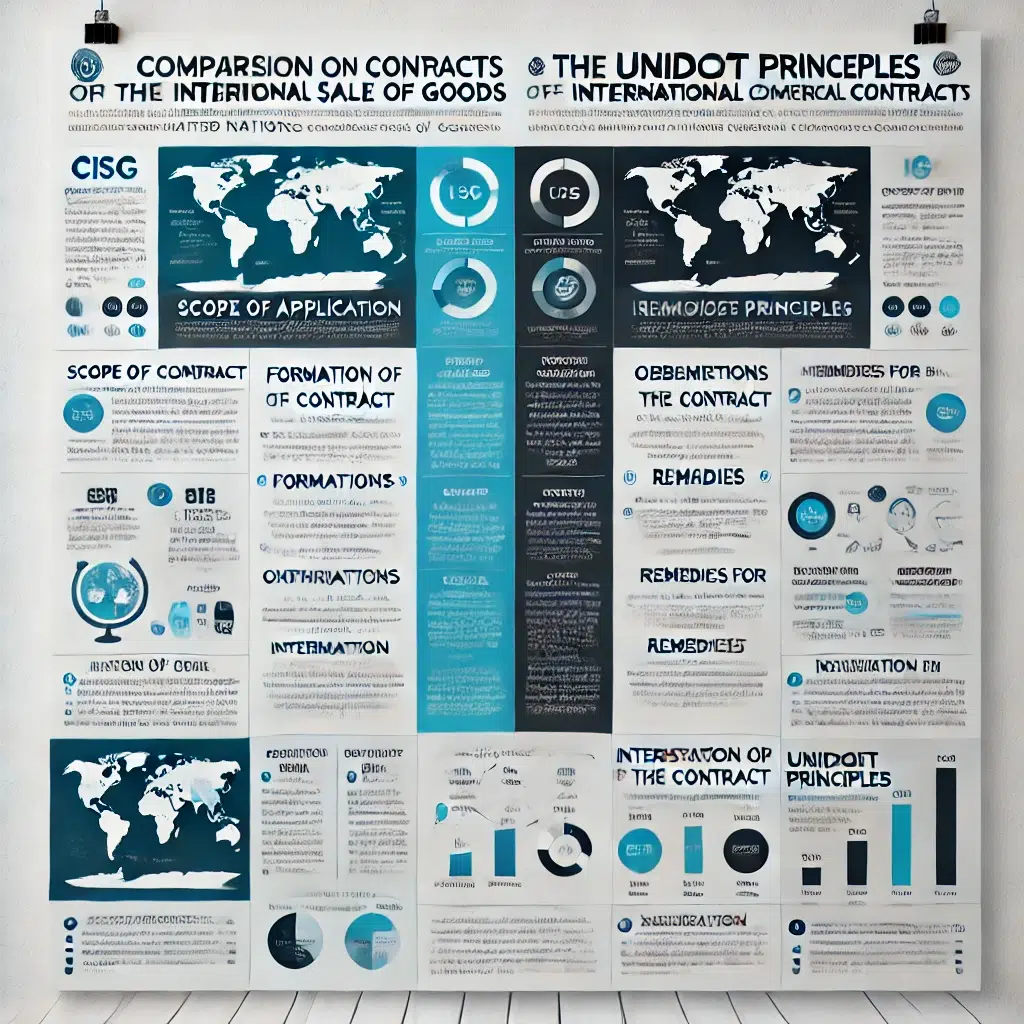Understanding International Sales Law: Navigating the CISG and Unidroit Principles for Professional Buyers.
Content….
In the complex world of international business, understanding the legal frameworks that govern international procurement is paramount for professional buyers. Two pivotal legal instruments in this domain are the United Nations Convention on Contracts for the International Sale of Goods (CISG) and the Unidroit Principles of International Commercial Contracts or short CISG and Unidroit Principles. Both play critical roles in shaping the contractual landscape for international business transactions. This blog post aims to demystify these instruments, highlighting their content, role, and practical implications for professional buyers engaged in international trade.
What is CISG
The CISG, adopted in 1980, serves as a uniform international sales law, aiming to facilitate international trade by removing legal barriers and promoting predictability and certainty in commercial transactions. It automatically applies to contracts for the international sale of goods between parties whose places of business are in different states, provided that these states are Contracting States to the CISG or that the rules of private international law lead to the application of the law of a Contracting State.
Content and Scope
The CISG governs various aspects of contracts for the sale of goods internationally, excluding specific categories such as sales by auction, of stocks, shares, investment securities, and personal items. It covers the formation of contracts, the obligations of the seller and buyer, the delivery of goods, conformity of goods, remedies for breach of contract, and various other aspects related to international sales contracts.
Role in International Trade
The role of the CISG in international trade cannot be overstated. It provides a comprehensive and universally applicable legal framework, facilitating the smooth execution of international sales contracts by offering standardized legal norms. This uniformity reduces the need for parties to negotiate the applicable law for their contracts, thus lowering transaction costs and legal uncertainty.
What is the Unidroit Principles
The Unidroit Principles, first published in 1994 and subsequently updated, are a set of rules intended to guide international commercial contracts, irrespective of the specific national laws that might apply. They are not a binding instrument but serve as a reference point for parties wishing to base their contracts on general principles of commercial law.
Content and Scope
The Unidroit Principles cover a wide range of topics relevant to commercial contracts, including general provisions, formation and validity of contracts, interpretation, content, performance, non-performance, and remedies. Unlike the CISG, which is limited to the sale of goods, the Unidroit Principles apply to a broader spectrum of commercial transactions.
Role in International Trade
The Unidroit Principles play a crucial role in international trade by offering a flexible and adaptable set of rules that parties can voluntarily choose to apply to their contracts. They serve as a neutral and balanced reference point, particularly useful in negotiations and in resolving disputes where parties seek an equitable solution without the constraints of a specific national law. They can also be used to interpret or supplement international instruments like the CISG or to fill gaps in their provisions.
Practical Implications for Professional Buyers
For professional buyers involved in international business, a thorough understanding of both CISG and Unidroit Principles is essential. Here are some practical implications of these instruments:
- Choice of Law: Buyers should be aware of the CISG’s automatic application to eligible contracts and consider whether its provisions are advantageous for their transactions. Where parties wish to opt-out of the CISG, this intention must be explicitly stated in the contract. Similarly, the Unidroit Principles can be chosen as the governing law if both parties agree.
- Contract Drafting and Negotiation: Knowledge of the default rules provided by the CISG and Unidroit Principles can significantly impact contract drafting and negotiation strategies. For instance, understanding the CISG’s provisions on the conformity of goods and remedies available can inform buyers’ rights and obligations under the contract.
- Risk Management: Familiarity with these legal frameworks enables buyers to better assess and manage risks associated with international transactions. This includes understanding their rights in case of non-conformity of goods, delivery delays, or other breaches of contract.
- Dispute Resolution: In case of disputes, both the CISG and Unidroit Principles offer frameworks for resolution. The CISG’s provisions on remedies and breach of contract provide a basis for claims and defenses in litigation or arbitration. The Unidroit Principles can serve as a tool for interpreting or supplementing the CISG or as a standalone framework if chosen by the parties.
Learn about CISG and the Unidroit Principles
The CISG and the Unidroit Principles are foundational elements of international sales law, each playing a unique role in facilitating international trade. For professional buyers, an in-depth understanding of these legal instruments is crucial for navigating the complexities of international transactions effectively. By incorporating these frameworks into their contractual practices, buyers can ensure more predictable, fair, and efficient outcomes in their international dealings. Whether drafting, negotiating, or enforcing international sales contracts, the CISG and the Unidroit Principles are indispensable guides for achieving success in the global market.
Learn more in the online offering from Jon Kihlman International Sales Law for Procurement Professionals. This comprehensive course covers all aspects of international sales law, from the basics of contract formation to the intricacies of cross-border disputes. Jon Kihlman, an expert in international commercial law with over 20 years of experience, will guide you through the course material, providing practical examples and real-world scenarios to help you apply what you learn.
By the end of this course, you’ll have a deep understanding of the legal framework governing international business, as well as the tools and strategies you need to protect your organization’s interests in cross-border transactions. You’ll be able to navigate complex contracts with ease, negotiate with confidence, and avoid costly mistakes.

Best of all, this course is designed with busy professionals in mind. You can complete it at your own pace, on your own schedule, and from anywhere in the world.
Investing in your professional development is a smart choice, and “International Sales Law for Procurement Professionals” is an excellent way to do it. Enroll today and take the second step towards mastering international sales law and CISG and Unidroit Principles.
Note: Illustration to the blogpost “CISG and Unidroit Principles for Professional Buyers” is created on March 2, 2024.
